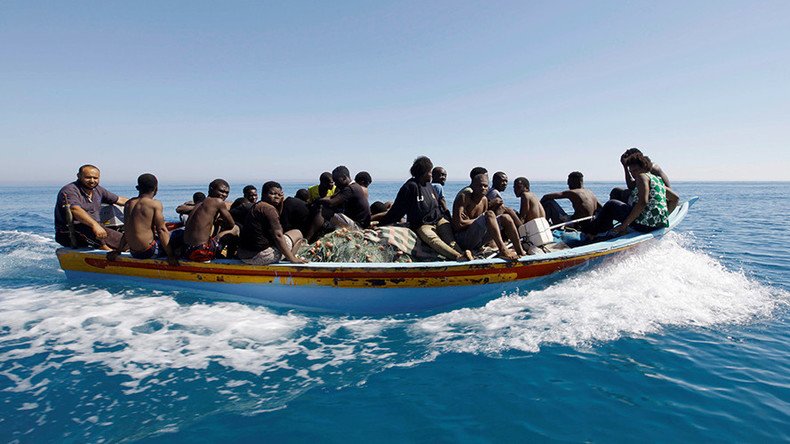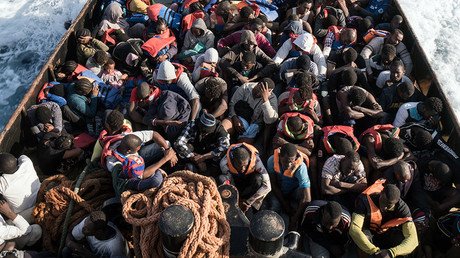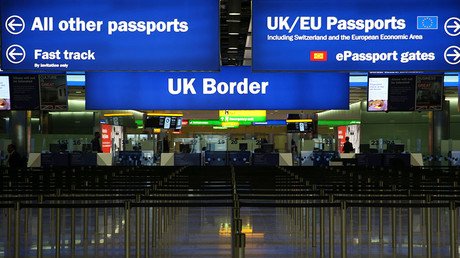EU anti-migrant mission in Mediterranean led to more illegal migration & deaths – UK Lords’ inquiry

The EU-led Operation Sophia in the Mediterranean Sea has failed, the UK House of Lords’ committee has found. The mission has only led to soaring of illegal migrant flows to Europe and “tragic increase in deaths” at sea.
Operation Sophia, launched in 2015 by the EU as a means to stop human smuggling in the Southern Central Mediterranean and “prevent the further loss of life at sea” failed to achieve its goal, according to the UK House of Lords’ EU Committee report published on Wednesday.
Available now: new EU Cmttee report on #OperationSophia: https://t.co/vXcoee2yZepic.twitter.com/qtkk4xqQw6
— Lords EU Committee (@LordsEUCom) July 11, 2017
The committee found that the migrant flows have only increased since the beginning of the operation, with a spike by 19 percent in the first half of this year compared to 2016.
“Irregular migration into Europe on the central Mediterranean route increased by 18 percent in 2016, and by another 19 percent in the first six months of 2017 compared to 2016,” the report says.
The committee further stated that “a naval mission is the wrong tool to tackle irregular migration” as the latter starts onshore. The report says that “once the boats have set sail, it is too late to undermine the business of people smuggling.”
The destruction of vessels, which was one of the mission’s tasks, led to “an unintended consequence” – the smugglers started to send those willing to reach European coast aboard “unseaworthy vessels.” This has only increased the risk for migrants, as “70 percent of all boats leaving the Libyan coast contributes to making journeys increasingly dangerous,” leading to “a tragic increase in deaths,” which is 2,150 as of 2 July.
In 2016 alone, the number of recorded deaths at sea reached 4,581, which is almost twice as many as in 2015.
The lawmakers said that “supporting economic development and good governance” across Sub-Saharan Africa is the only way to tackle mass migration in the long term.
Humanitarian efforts, including “using more suitable vessels than the high-end air and naval assets of Operation Sophia,” are still necessary, according to the report. Operation Sophia is currently on its second phase of the total of four stages, which envisages “boarding, search, seizure and diversion of smugglers' vessels,” as well as training of the Libyan coastguards and navy.
The latter task is vital to proceed to further stages of the operation, but it is “not currently possible,” according to one of the witnesses cited in the report, the deputy head of Euro Atlantic Security Policy, Foreign and Commonwealth Office, Simon Jones.
He added that they “are focusing very much at the moment on making a success of the training of the coastguard.” However, “it is too early to assess the effectiveness of recent efforts by the EU to train the Libyan coastguard,” the report concluded.
The latest committee’s conclusions further confirm its previous report dubbed ‘Operation Sophia, the EU’s naval mission in the Mediterranean: an impossible challenge’, published last year.
The document said that despite “valuable search and rescue work at sea,” the operation “had not in any meaningful way deterred the flow of migrants, disrupted the smugglers’ networks, or impeded the business of people smuggling on the central Mediterranean route.” It also said that Operation Sophia responds to symptoms, not causes of the European refugee crisis, while the huge flow of irregular migration stems from “the weakness of the Libyan state.”
So far, Operation Sophia, managed to arrest 110 suspected migrant smugglers, destroy 452 smuggler vessels and rescue a total of 33,830 migrants, according to the report. The mission has been extended until 27 July 2017 and is expected to cost up to €18.5 million ($21.2 million).














